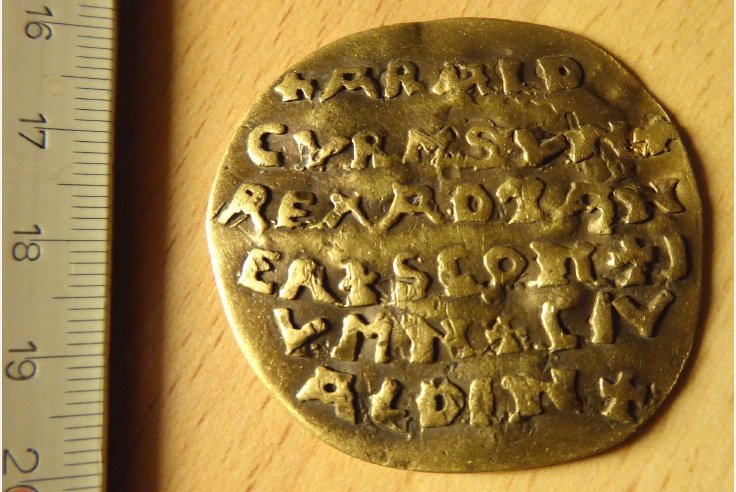Long-Lost Burial Site Of Viking King Harald Bluetooth Discovered By Satellites?
Conny Waters – MessageToEagle.com – Archaeologists have tried to find the burial site of legendary Viking King Harald Bluetooth for decades.
Using satellite remote sensing tools, researchers say they have now confirmed that a large Viking Age burial mound could hold the remains of the King Bluetooth, whose name was the inspiration for Bluetooth wireless technology. It can be added the King gained the nickname Blåtand (Bluetooth) because he had a dead tooth that was dark blue.
Using satellite remote sensing tools, researchers say they have now solved ‘one of history’s most enduring mysteries’ and confirmed that a large Viking Age burial mound in the village of Wiejkowo did belong to the 10th-century king of Denmark and Norway, Harald Gormsson Bluetooth. Left: Credit: Marek Kryda – Right: Credit: King Harald Bluetooth Public domain
“Harald “Bluetooth” Gormsson was King of Denmark for nearly 30 years, beginning in approximately 958 AD when his brother and favored son of Gorm the Old was killed in England during attacks near Ireland. During his reign, Bluetooth united the outlying tribes of Denmark. He defended his people from many Norwegian and German incursions while overseeing the completion of vast construction projects that strengthened his country’s defenses. Bluetooth is equally known for casting off the Norse pagan traditions and becoming a devout Christian who strove to convert the people of Denmark during his rule peacefully.” 1
Some years ago, an extraordinary Viking treasure connected to King Harald Bluetooth has been found on the island of Rügen in the Baltic Sea in northern Germany. “Among the artifacts discovered on the island of Rügen was an amulet made in the shape of Mjölnir, known as the Hammer of Thor.” 2
Despite converting to Christianity, King Harald Bluetooth did not forget about the ancient Norse gods, which is why the Christian King carried a Pagan amulet.
The final resting place of the 10th-century King of Denmark and Norway, Harald Gormsson Bluetooth, has long been an archaeological riddle, but this may have changed now.
“The death and possible burial site of the Danish king Harald Gormsson Bluetooth was until now one of history’s most enduring mysteries.
The space-based reconnaissance allowed us to look at large swaths of landscape and find archaeological disturbances within the land, some as small as 12 inches (30.5 centimeters) long.
In a discipline where discovery was traditionally confined to a two-meter-square excavation, 21st-century technology satellite imagery has helped to make a breakthrough discovery of the possible burial mound of Harald Bluetooth, ” lead researcher Marek Kryda, author of the best-selling book Viking Poland, told TFN.
Mysterious Viking Age Burial Mound In The Village Of Wiejkowo, Poland
Curmsun Disc. Credit: Sven Rosborn
Does the enigmatic Curmsun Disc hold vital clues to unraveling the mystery of Bluetooth’s burial site?
“Hidden in a crypt of a ruined church in Poland, for many years, the golden Curmsun Disc did not see the modern world until recently.
The Curmsun Disc is a remarkable Norse artifact with an intriguing inscription that tells an interesting story about the Jomsvikings and legendary King Harald Bluetooth.
As reported by the TFN, “the discovery now confirms earlier speculation by Swedish archaeologist Sven Rosborn who suggested the Viking king was buried in the area following the 2014 discovery of a gold disc known as the Curmsun disc.
The disc’s Latin inscription mentioned the Viking king as the ‘ruler of Danes, Scania and the Viking fortress of Jomsborg’, which is today the town of Wolin just 3.5 miles west of the Wiejkowo burial mound.
According to Rosborn, the Curmsum disc, which he believed was a ‘grave gift’, was originally discovered alongside skeletal remains and a stash of other valuables in 1841 in a stone burial chamber underneath the current building of the local church in Wiejkowo.
The discovery confirms earlier speculation by Swedish archaeologist Sven Rosborn who suggested the Viking king was buried in the area following the 2014 discovery of a gold disc known as the Curmsun disc. Credit:
But doubts about whether the king actually died and was buried in the village have divided archaeologists.
Kryda said: ‘There’s no doubt that the golden Wiejkowo disc found in the tomb is an extraordinary find.
“However it’s worth mentioning that Rosborn’s strong suggestion that Bluetooth was buried in Wiejkowo was not based on research on the ground in Wiejkowo.
Viking expert Marek Kryda said: “The satellite research fully confirmed the existence of a large Wiejkowo Mound, and of course at the same time confirmed that Wiejkowo is the burial site of Bluetooth. And that would mean that only the burial mound is his real grave, the original church was only a later addition to it. Using Ground-Penetrating Radar Imagery will help us see what was inside.” Credit:
“And that would mean that only the burial mound is his real grave, the original church was only a later addition to it.
“According to Danish archivist Steffen Harpsøe, the disc may have been created over 70 years after Bluetooth’s burial by local priests around Jomsborg and Wiejkowo between 1050-1125 – and only then placed in his Royal crypt.
See also: More Archaeology News
“Using Ground-Penetrating Radar Imagery will help us see what was inside.”
If scientists can confirm that the burial mound is the resting place of legendary King Harald Bluetooth it will be a major archaeological discovery!
Written by Conny Waters – AncientPages.com Staff Writer
Expand for references













